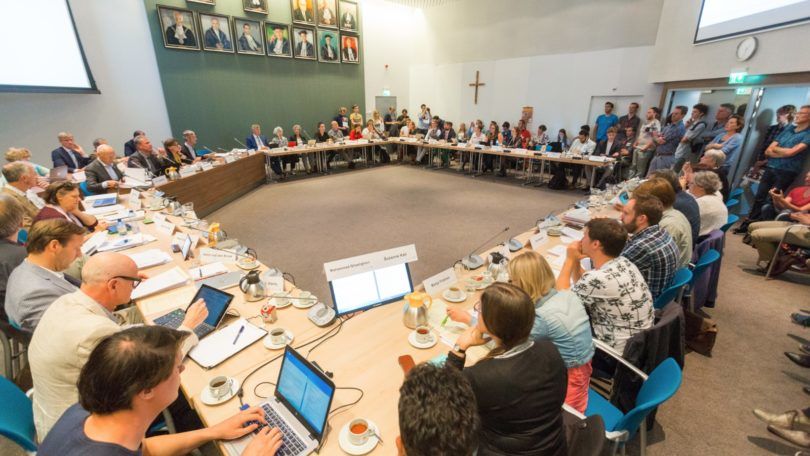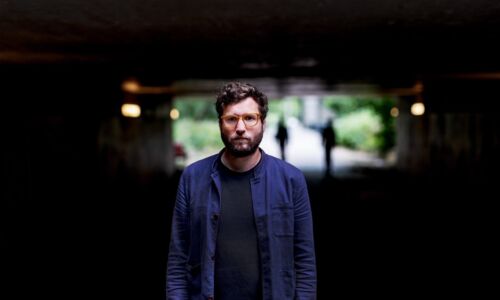Speaking English in council meetings is one step too far
-
 Foto: Marjolein van Diejen
Foto: Marjolein van Diejen
International employees and students find it difficult to understand the Works Council and Student Council. Not so surprising, since most discussions and policy documents are in Dutch.
You could almost call it the University’s mantra: Everyone should feel welcome on the Nijmegen Campus. The new internationalisation vision document reads like a utopia: “In 2025, we will form an inclusive Radboud community where all members feel included, irrespective of their nationality and background.” The participational bodies are referred to as organs that ‘take everyone’s needs into account.’
At the moment, the reality is somewhat different. A striking example of this is the decision by American Kristina Hodelin-ter Wal to resign from the Works Council in December 2017. ‘I felt there was little I could contribute as member of the Joint Assembly. There was too much of a language barrier.’ Hodelin-ter Wal resigned as representative of the PhD Organisation Nijmegen (PON) after three months on the Council.
Bilingualism
This motivated the PON fraction to work towards an official language policy in central Joint Assemblies, which bring together the University Student Council, the Works Council and the Executive Board. In early October, their proposal will be discussed by the Executive Board. PON pleads for bilingualism: employees and students should be able to choose whether to express themselves in Dutch or in English.
Student council
Never before has an international student been member of the University Student Council. Student party AKKUraatd wants accessible student participation and calls for a translation centre that can translate all policy documents into English. To guarantee the quality of the discussions, AKKUraatd is willing to have meetings held in Dutch. International students in all participational bodies should be offered free Dutch language courses. ASAP, the other student party, is also in favour of English documents and language courses for all international members of participational bodies, but is still deliberating the issue of the working language in meetings.
In their proposal the fraction writes that a ‘hostile attitude’ towards international representatives in participational bodies led to Hodelin-ter Wal resigning from the Works Council. The PhD student herself says she simply didn’t feel welcome. ‘I noticed that people weren’t happy with the fact that I spoke English.’
So should Dutch participational body members switch to English, a language they are less proficient in? No, say the PON PhD students. The three-member fraction pleads for a fully bilingual Joint Assembly, one in which every speaker can choose between English and Dutch. This requires a direct translation service, which Student Council and Works Council members can access through earphones.
The idea is not new: an interpreter did attend Joint Assembly meetings, typing along with the discussion. Hodelin-ter Wal could read along on a screen, but this didn’t work, she says. ‘I couldn’t follow the conversation. It makes sense, when you think about it: debates are really fast, and a translator is only human.’ Simone Lederer, member of the PON fraction, confirms that details were lost in translation. ‘Not to mention that there was no way you could join the discussion.’
Another PON argument for bilingual participational bodies is the fact that policy documents are usually published in Dutch on Radboudnet, in some cases with a short summary in English. If you don’t speak Dutch, you can’t learn about the University’s policy. PON believes that this is a ‘basic right’: every student and employee should be able to learn about how the University functions. And that means every document should be available in Dutch and in English.
Huge job
President of the Works Council Bernadette Smelik doesn’t agree with the image sketched by PON of a hostile attitude towards Hodelin-ter Wal. ‘On the contrary, I remember everyone was very willing to help her.’ Smelik suspects this is not just due to the language barrier, but to a cultural clash. ‘Last year we also had an international employee on the Works Council. That worked really well.’
However, Smelik is also aware of the fact that there is broad support for an official language policy in the Joint Assembly. ‘The PON’s document forms good input for the discussion.’ According to Smelik, the plea for full bilingualism is ‘what you would, of course, want ideally. The question is how to achieve it.’
Elsewhere in the Netherlands
The debate on language policy in participational bodies is also raging elsewhere. A number of Dutch universities, including Wageningen, have decided to hold all meetings in English. Other institutions have opted for bilingual participation bodies, like the University of Groningen, where members of participational bodies can choose in which language they wish to express themselves. Their words are translated and projected on a screen. Radboud University, together with other institutions like Erasmus University Rotterdam, belongs to the third and largest group of institutions that haven’t yet decided which direction to follow.
Smelik doubts whether it’s a good idea to translate all of the Assembly’s paper work. She refers to Dutch legislation: universities are obliged to write all their regulations in Dutch. Translations must be certified or include a disclaimer that the Dutch text is leading.
And is it worth the investment to translate all documents into English? Translating policy documents is already a huge job, as they tend to run into dozens of pages. Smelik: ‘Should the University bear these costs, while there is also such a strong need for more lecturers and student psychologists, for example?’
She also predicts higher work pressure. The participational bodies work with hard deadlines. ‘If a translation is needed quickly, a participational body member or administrative employee will have to take it on, on top of all their other work.’
No choice
Nevertheless, PON believes the need to be very real. Fraction member Katrin Sutter: ‘Radboud University is focused on internationalisation, but the participational bodies lag behind. The Joint Assembly is not yet representative of the Campus. The voice of international employees can’t be heard.’
According to the resigning Kristina Hodelin-ter Wal, a lot of work is needed to make the Joint Assembly truely accessible to non-Dutch members. As PON argues in its proposal, the Joint Assembly is ruled by Dutch culture – international employees and students should think twice before joining the University’s highest participational body.
The PON fraction is aware that bilingualism is expensive. But if the University really wants everyone to be represented, it has no choice, say the fraction members.
Pending the Joint Assembly in early October, the Executive Board refrained from commenting on the language policy issue. ‘Ideally, central participational bodies should adequately reflect the Campus,’ says spokesman Martijn Gerritsen. ‘In the coming period we will discuss how we can make this happen.’
At faculty level
According to the German Samuel Hofmann, member of the Faculty Student Council of the Faculty of Social Sciences, the poor involvement of international students in participational bodies is a classic chicken-and-egg story. ‘Policy documents, summaries and communications from the Executive Board, the Faculty and study programmes are by and large in Dutch. This creates a high threshold for international students who want to join the debate. When I sat on the Programme Committee for Psychology last year, I consciously decided to learn Dutch. This meant that the discussions could be held in Dutch. This year, the committee has two international members who don’t speak any Dutch. I’m curious about their experiences. It’s time for the University to take the next step. The faculties are waiting for a decision from above.’
Bas van der Zandt, who sat on the Faculty Student Council of the Faculty of Science, emphasises Hofmann’s argument. ‘Nearly all policy documents at the Faculty of Science are in Dutch. Since the members of participational bodies and the Board are mostly Dutch, meetings and documents are also in Dutch. As a result, international students on the programme committees have to ask their Dutch colleagues to explain the documents to them. Once central participational bodies take the lead, it will be easier for faculties to make the shift to internationalisation.’



